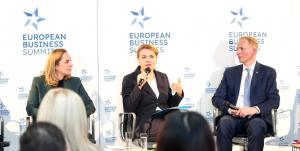
On the heels of her engagement for climate action at COP29, UNECE Executive Secretary Tatiana Molcean visited Brussels this week to share insights from UNECE support for sustainable water management and to discuss joint priorities with high-level representatives from the European Commission.
In a High-level Panel during the EU Business Summit “Rewater EU: how to accelerate EU competitiveness through water”, the Executive Secretary stressed that resilient and efficient water resources management practices and policies are key for a safe investment and businesses environment and can therefore boost competitiveness.
She further emphasized that more private finance is needed to ensure water resilience, which calls for the mobilization of more innovative finance blending both public and private finance. The discussions underlined how by integrating these efforts, the EU can accelerate its competitiveness by promoting sustainable water management practices, safeguarding resources, and fostering economic growth while ensuring the well-being of its citizens.
Drawing attention to a key dimension of water challenges, Ms. Molcean highlighted that the majority of freshwater resources in the EU and worldwide are transboundary in nature, which brings both shared risks (e.g. floods and scarcity impacts) but also common opportunities to maximize economic benefits. Transboundary water cooperation is therefore required to provide the enabling policy and institutional environment needed, where the UN Water Convention, serviced by UNECE, is a proven legal framework and intergovernmental platform. The EU is a strong supporter of the Water Convention, both within Europe and to promote accession to and implementation of the Convention worldwide.
She also highlighted how the Protocol on Water and Health, jointly serviced by UNECE and WHO-Europe, has been instrumental in helping countries from the pan-European region to improve the quality and safety of drinking water and sanitation through technical and policy support. With currently 29 Parties, including 16 EU member states as well as several EU candidate countries, the Protocol encourages governments to develop clear, strong policies and legal frameworks that prioritize water and health.
The Water Convention and the Protocol on Water and Health are useful instruments for countries to create the enabling conditions to attract the investments needed in the water sector by catalyzing funding and financing. UNECE’s PIERS methodology to evaluate the sustainability of infrastructure and PPPs projects can further support these efforts.
European Union countries account for around half of UNECE’s member States, and the EU is actively involved across UNECE’s areas of work. Many UNECE Conventions, standards and policy tools are in turn applied by the EU and its members.
To build on this strong partnership, the Executive Secretary met with European Commission Directors responsible for trade, transport, energy, and the environment. She also met in Copenhagen with the Executive Director of the European Environment Agency to discuss ongoing implementation of UNECE’s Multilateral Environmental Agreements in the EU.
Photo credit: European Business Summits